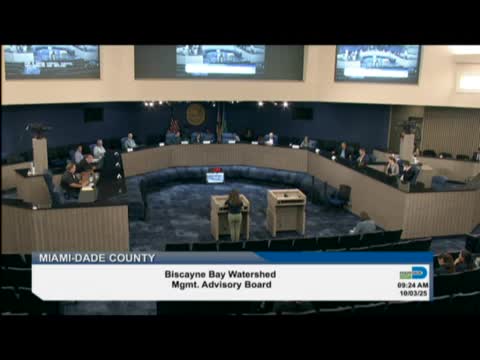Miami-Dade Officials Discuss Legislative Priorities Including Biscayne Bay Protection
October 03, 2025 | Miami-Dade County, Florida
This article was created by AI summarizing key points discussed. AI makes mistakes, so for full details and context, please refer to the video of the full meeting. Please report any errors so we can fix them. Report an error »

On October 3, 2025, the Biscayne Bay Watershed Management Advisory Board convened to address critical issues surrounding the reorganization of the Department of Regulatory and Economic Resources (RER) and its implications for environmental protection in Miami-Dade County. The meeting highlighted significant concerns from community members and environmental advocates regarding the clarity of responsibilities within the newly structured agency, particularly in relation to permitting and enforcement.
Samantha Barking, a resident and environmental advocate, raised urgent questions about the division of responsibilities between the newly restructured Durham and RER. She emphasized the potential risks of unclear authority, which could hinder effective responses to pollution, flooding, and habitat degradation. Barking called for immediate clarification on whether Durham would continue to issue operating permits and how its expert staff would engage in the permitting process. She urged the board to seek answers from the administration, stressing that the public deserves transparency regarding who is accountable for environmental protection.
Rachel Silverstein, executive director of Miami Waterkeeper, echoed these concerns, highlighting the lack of clarity and potential imbalance in environmental regulation due to the reorganization. She proposed that the board request a report from the administration detailing metrics of environmental degradation, including violations resolved, water quality data, and habitat loss. Silverstein argued that establishing clear metrics would be essential for monitoring the effectiveness of the new structure and ensuring that environmental standards are upheld.
The meeting also featured a proposal from Silvio Frank Pupukasco, a member of the Climate Resilience Committee, advocating for the implementation of an integrated marine drone program in Biscayne Bay. This initiative aims to enhance water quality surveillance and debris removal, leveraging technology to improve environmental monitoring and response capabilities.
As the meeting progressed, the board welcomed new members, including Commissioner Natalie Millian Orbis and Dr. Jed Redwine from Florida International University, who expressed their commitment to addressing the environmental challenges facing Biscayne Bay. The board also received updates on ongoing projects funded by over $50 million from the Florida Department of Environmental Protection, aimed at restoring water quality and habitats in the region.
In conclusion, the discussions at the Biscayne Bay Watershed Management Advisory Board meeting underscored the pressing need for clarity and accountability in environmental governance. As the community grapples with the implications of the reorganization, the board's commitment to oversight and proactive measures will be crucial in safeguarding Biscayne Bay's ecological health and ensuring sustainable development practices in Miami-Dade County. The board plans to revisit these topics in future meetings, emphasizing the importance of ongoing dialogue and transparency in environmental management.
Samantha Barking, a resident and environmental advocate, raised urgent questions about the division of responsibilities between the newly restructured Durham and RER. She emphasized the potential risks of unclear authority, which could hinder effective responses to pollution, flooding, and habitat degradation. Barking called for immediate clarification on whether Durham would continue to issue operating permits and how its expert staff would engage in the permitting process. She urged the board to seek answers from the administration, stressing that the public deserves transparency regarding who is accountable for environmental protection.
Rachel Silverstein, executive director of Miami Waterkeeper, echoed these concerns, highlighting the lack of clarity and potential imbalance in environmental regulation due to the reorganization. She proposed that the board request a report from the administration detailing metrics of environmental degradation, including violations resolved, water quality data, and habitat loss. Silverstein argued that establishing clear metrics would be essential for monitoring the effectiveness of the new structure and ensuring that environmental standards are upheld.
The meeting also featured a proposal from Silvio Frank Pupukasco, a member of the Climate Resilience Committee, advocating for the implementation of an integrated marine drone program in Biscayne Bay. This initiative aims to enhance water quality surveillance and debris removal, leveraging technology to improve environmental monitoring and response capabilities.
As the meeting progressed, the board welcomed new members, including Commissioner Natalie Millian Orbis and Dr. Jed Redwine from Florida International University, who expressed their commitment to addressing the environmental challenges facing Biscayne Bay. The board also received updates on ongoing projects funded by over $50 million from the Florida Department of Environmental Protection, aimed at restoring water quality and habitats in the region.
In conclusion, the discussions at the Biscayne Bay Watershed Management Advisory Board meeting underscored the pressing need for clarity and accountability in environmental governance. As the community grapples with the implications of the reorganization, the board's commitment to oversight and proactive measures will be crucial in safeguarding Biscayne Bay's ecological health and ensuring sustainable development practices in Miami-Dade County. The board plans to revisit these topics in future meetings, emphasizing the importance of ongoing dialogue and transparency in environmental management.
View full meeting
This article is based on a recent meeting—watch the full video and explore the complete transcript for deeper insights into the discussion.
View full meeting